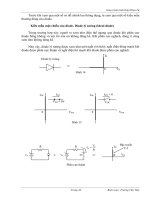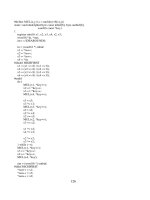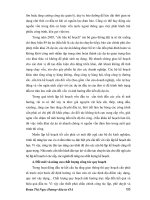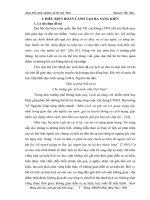Chapter 10 gear VẼ CƠ KHÍ
Bạn đang xem bản rút gọn của tài liệu. Xem và tải ngay bản đầy đủ của tài liệu tại đây (2.22 MB, 39 trang )
GEAR
The south-pointing chariot (or carriage) was an ancient Chinese two-wheeled
vehicle that carried a movable pointer to indicate the south, no matter how
the chariot turned. Usually, the pointer took the form of a doll or figure with
an outstretched arm. The chariot was supposedly used as a compass for
navigation, and may also have had other purposes.
There are legends of earlier south-pointing chariots, but the first reliably
documented one was created by Ma Jun (c. 200–265 CE Common Era) of Cao Wei
during the Three Kingdoms, about eight hundred years before the first
navigational use of a magnetic compass. No ancient chariots still exist,
but many extant ancient Chinese texts mention them, saying they
were used intermittently until about 1300 CE. Some include information
about their inner components and workings.
There were probably several types of south-pointing chariot which
worked differently. In most or all of them, the rotating road wheels
mechanically operated a geared mechanism to keep the pointer
aimed correctly. The mechanism had no magnets and did not automatically
detect which direction was south. The pointer was aimed southward by
hand at the start of a journey. Subsequently, whenever the chariot turned,
the mechanism rotated the pointer relative to the body of the chariot to
counteract the turn and keep the pointer aiming in a constant direction,
to the south. Thus the mechanism did a kind of directional dead reckoning,
which is inherently prone to cumulative errors and uncertainties.
Some chariots' mechanisms may have had differential gears. If so,
it was probably the first use of differentials anywhere in the world.
Do you know how a differential works? Would you believe
that the Chinese invented one nearly three thousand years
ago, and used it as a non-magnetic compass to keep track
of north and south as they traveled?
The figure on top of this amazing machine maintains its
orientation no matter which way the chariot is pulled,
pushed, turned or even how fast. How it does this is via a
clever application of gears and mathematical ratios that
would have earned the awe and admiration of Pythagoras,
Euclid and Aristotle themselves.
It took us exactly eight prototypes to get the gearing
worked out properly -- a fortuitous number, since eight is
also the luckiest number in Chinese traditions.
his model is a 1/10 scale reproduction of the South
Pointing Chariot. The completed kit stands 14 inches tall,
14 inches long and 7 inches wide. It contains over 37
precision cut hardwood pieces (not including the gear
teeth), and when properly constructed, it really works!
Examples of the South Pointing Chariot can be found in
fine museums all over the world, and now you can have
your own museum quality model for your personal display
of ancient technology.









